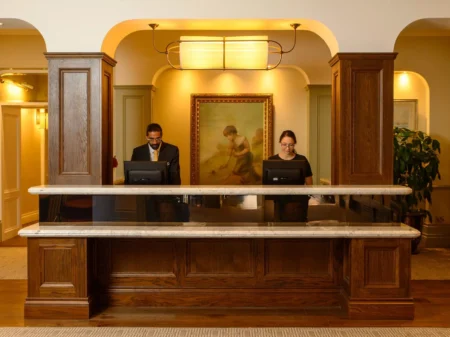10 September 2025
By Roger Kennedy
roger@TheCork.ie

File photo of Hotel Reception Desk
Running a boutique hotel isn’t just about offering beds for the night. It’s about crafting experiences that linger in guests’ memories long after they’ve returned home. In a market where leisure travellers contributed to more than 70% of the market revenue in 2023, understanding what makes boutique properties special has never been more crucial.
The boutique hotel sector has transformed from a niche market into a formidable force within hospitality. The global boutique hotel market size was valued at €23 billion in 2023 and is projected to reach €37 billion by 2030, growing at a CAGR of 7.1% from 2024 to 2030. But what exactly sets these properties apart? It’s the delicate balance between intimacy and luxury, between standardised service and personal touches that money can’t always buy.
Understanding the Boutique Hotel Landscape
Your boutique hotel occupies a unique position in the hospitality ecosystem. Unlike their larger counterparts, boutique properties thrive on character, authenticity, and the ability to tell a story through every corner and conversation. A boutique hotel is a special type of small hotel that has less than 100 rooms, but size alone doesn’t define success in this space.
The modern traveller seeks more than just accommodation. They crave connections, authenticity, and experiences that reflect the local culture. Your property becomes a gateway to these desires, offering curated moments that larger establishments simply cannot replicate. This shift in guest expectations has fundamentally altered how boutique hotels operate and compete.
What truly distinguishes boutique properties? It’s the freedom to be different. Where chain hotels rely on consistency across locations, you have the liberty to embrace quirks, celebrate local artisans, and create spaces that feel more like carefully curated homes than temporary lodgings. Every design choice, from the artwork adorning your walls to the locally sourced breakfast offerings, tells part of your story.
The challenge lies in maintaining this personalised approach whilst ensuring operational efficiency. Your guests expect the reliability of established hotels combined with the charm of independent properties. Meeting these dual expectations requires careful planning, strategic thinking, and an unwavering commitment to your unique vision.
Financial Management and Strategic Budgeting
Financial acumen separates thriving boutique hotels from those merely surviving. RevPAR offers a better picture of a hotel’s revenue performance than ADR alone, as it takes into account occupancy and pricing. Understanding these metrics isn’t just about tracking numbers; it’s about making informed decisions that drive profitability.
Your financial strategy must account for the unique cost structure of boutique operations. Whilst you might command premium rates, your per-room operational costs often exceed those of larger properties. This paradox requires creative solutions and meticulous attention to detail. Consider implementing dynamic pricing strategies that respond to market demand whilst maintaining your brand’s perceived value.
Working with a small business accountant who understands the hospitality sector can transform your financial management. They’ll help you navigate complex tax obligations, identify cost-saving opportunities, and develop forecasting models that account for seasonal fluctuations. Their expertise proves invaluable when analysing your property’s performance against industry benchmarks.
Cash flow management presents particular challenges for boutique properties. Unlike chain hotels with corporate backing, you must carefully balance investment in guest experiences with maintaining healthy reserves. Regular financial reviews help identify trends before they become problems. Are your food and beverage costs creeping upward? Is your labour percentage optimal for your service level? These questions demand constant attention.
Revenue diversification offers another path to financial stability. Beyond room revenue, explore opportunities in event hosting, partnerships with local businesses, and unique packages that command premium pricing. RevPAG provides insights into guests’ overall spending behaviour, helping to tailor services and marketing efforts. This holistic view of revenue potential helps maximise each guest’s contribution to your bottom line.
Creating Exceptional Guest Experiences

File photo of drink
Excellence in boutique hospitality isn’t accidental. It emerges from deliberate choices, careful training, and an organisational culture that values genuine connections over scripted interactions. Your team members become storytellers, local ambassadors, and problem-solvers who anticipate needs before they’re expressed.
Start with arrival experiences that set the tone for the entire stay. Perhaps it’s a welcome drink infused with local ingredients, or a handwritten note acknowledging a special occasion. These gestures cost little but create lasting impressions. Remember, boutique hotels have become the top choice for vacationers precisely because they offer what larger properties cannot: genuine personalisation.
Your property’s size becomes an advantage when crafting bespoke experiences. Know your guests’ preferences, remember their names, and create touchpoints throughout their journey that reinforce your commitment to their satisfaction. Whether it’s arranging a surprise birthday amenity or recommending a hidden local restaurant, these personal touches transform stays into stories worth sharing.
Building and Leading Your Dream Team
Your staff embody your brand more powerfully than any marketing campaign ever could. In boutique hotels, where 53% of guests prioritise hotels offering conveniences like personalised service, every team member becomes crucial to success.
Recruitment in the boutique sector requires looking beyond technical skills. Seek individuals who share your passion for hospitality, demonstrate genuine warmth, and possess the versatility to handle multiple responsibilities. Your front desk agent might also serve as concierge, local guide, and problem-solver—often within the same interaction.
Training programmes must reflect this multifaceted reality. Whilst larger properties can afford specialists, your team members need broader skill sets. Invest in cross-training initiatives that build competence across departments. When your bartender can confidently handle check-ins during busy periods, or your housekeeping supervisor can assist with event setup, operational flexibility increases dramatically.
Creating a positive workplace culture directly impacts guest satisfaction. Happy employees create happy guests—it’s that simple. Regular team meetings, recognition programmes, and opportunities for professional development demonstrate your commitment to their growth. Consider profit-sharing schemes or performance bonuses that align team members’ success with the property’s performance.
Marketing Your Unique Property Story
Strategic paid advertising can significantly boost your property’s visibility. Partnering with a PPC agency in Ireland can help you navigate the complexities of online advertising whilst ensuring your marketing euros work harder. These specialists understand the local market dynamics and can craft campaigns that resonate with both domestic and international travellers seeking unique Irish hospitality experiences.
Pay-per-click advertising offers immediate visibility and measurable results, particularly valuable during shoulder seasons or when launching new packages. A well-managed campaign targets potential guests at the exact moment they’re searching for accommodation, capturing high-intent traffic that converts into bookings. The key lies in balancing advertising spend with direct booking benefits, ensuring profitability whilst building brand awareness.
Strategic partnerships with online travel agencies balance necessary exposure with direct booking goals. Whilst OTAs provide valuable visibility, cultivating direct relationships remains crucial for long-term profitability. Implement booking incentives, loyalty programmes, and exclusive experiences available only through direct channels.
Your marketing must reflect seasonal patterns whilst building year-round appeal. Shoulder seasons offer opportunities for creative packaging and targeted campaigns. Perhaps it’s a writers’ retreat during quiet autumn months or a culinary weekend featuring local harvest ingredients. These targeted offerings attract specific audiences whilst maintaining occupancy during traditionally slower periods.
Maintaining Property Excellence and Guest Comfort
Physical spaces tell stories in boutique hotels. Every design choice, from lobby furniture to bedroom linens, contributes to the overall narrative. Regular maintenance preserves this carefully crafted atmosphere whilst preventing costly emergency repairs.
Preventive maintenance schedules protect your investment whilst minimising guest disruption. Create detailed checklists for daily, weekly, and monthly tasks. Train your team to spot potential issues before they escalate. A squeaky door hinge fixed today prevents a negative review tomorrow.
Guest comfort extends beyond aesthetics to fundamental elements like quality sleep. Investing in premium bedding, such as a contract open coil spring mattress designed for commercial use, significantly impacts satisfaction ratings. Quality mattresses withstand frequent use whilst providing the comfort guests expect from boutique properties. These investments pay dividends through positive reviews and repeat bookings.
Sustainability increasingly influences guest choices. Hotels can save on energy costs and water bills by adopting sustainable energy solutions such as LED lighting and smart controls. Beyond cost savings, these initiatives appeal to environmentally conscious travellers who actively seek responsible accommodation options.
Future-Proofing Your Boutique Hotel Business
Success in boutique hospitality requires constant evolution. Yesterday’s innovations become today’s expectations, demanding continuous adaptation.
Technology integration should enhance rather than overwhelm your boutique character. Choose solutions that streamline operations whilst preserving personal touches. Cloud-based property management systems offer flexibility and scalability. Mobile check-in options appeal to tech-savvy guests whilst reducing front desk congestion during peak periods.
Building resilience means preparing for various scenarios. Economic downturns, unexpected events, and changing travel patterns all impact boutique properties disproportionately. Develop contingency plans, maintain cash reserves, and cultivate diverse revenue streams that provide stability during uncertain times.
Innovation doesn’t always mean expensive technology. Sometimes it’s reimagining existing spaces, creating new guest experiences, or finding novel ways to showcase local culture. Stay curious about emerging trends whilst remaining grounded in what makes your property special.
Remember, boutique hotels succeed by being themselves, not by imitating others. Your unique perspective, combined with operational excellence and genuine hospitality, creates experiences guests can’t find elsewhere. Focus on continuous improvement rather than perfection. Listen to guest feedback, adapt to changing expectations, and never lose sight of why you entered this remarkable industry.
The art of running a profitable boutique hotel lies in balancing numerous competing demands whilst maintaining a clear vision. Financial success follows when you create spaces and experiences that resonate deeply with your chosen audience. In an industry where boutique hotels are experiencing robust growth, properties of all sizes prove that impact isn’t determined by scale alone. Your commitment to excellence, attention to detail, and genuine passion for hospitality will ultimately define your success in this dynamic and rewarding sector.
